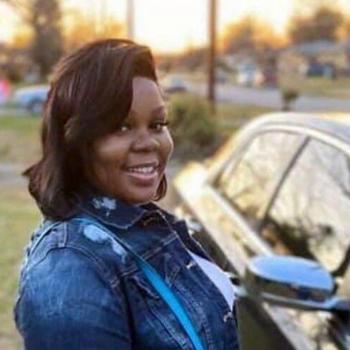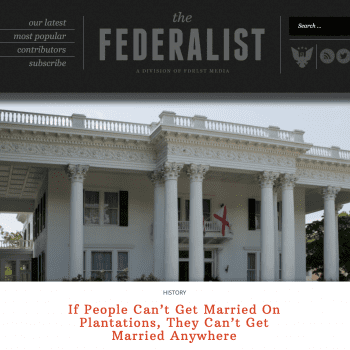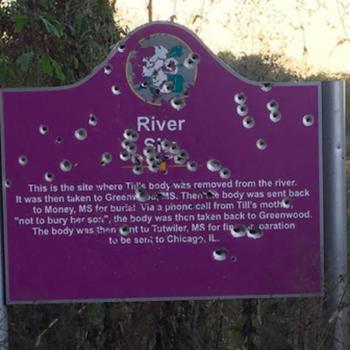 The way the poor are talked about in this country is absolutely reprehensible. And the fact that this goes on in a country in which a vast majority of the population follows the teachings of a man who spent his time absolutely blasting the rich while hanging out with the poor and the dregs of society is beyond baffling.
The way the poor are talked about in this country is absolutely reprehensible. And the fact that this goes on in a country in which a vast majority of the population follows the teachings of a man who spent his time absolutely blasting the rich while hanging out with the poor and the dregs of society is beyond baffling.
My husband and I are graduate students. We are raising two children on our combined graduate student stipends. We don’t pay federal income tax, but we do pay sales tax and state and local taxes. Our children are on state medicaid for their health care. Mitt Romney thinks we’re moochers. Not only do we not pay federal income tax, we also take government money from a state program – medicaid. Paul Ryan wants to cut the state medicaid program my children are on. And here’s where this starts to get personal.
Adding our children to our student health insurance plans would cost us an extra $8000 a year, not counting deductibles or copays, and that would be on top of the astronomical amount it costs to send each of them to daycare (seriously, look up daycare prices sometime!). Did I mention that we are living on graduate school stipends? What boggles my mind is that Mitt Romney, who earns millions of dollars a year, thinks that families like mine are some sort of freeloading leeches.
Fortunately, we’re lucky. My husband and I are able to subsidize our graduate student stipends with blogging and tutoring, and we don’t have student loan debt from our undergraduate degrees because we both had scholarships. More than that, we know that this is temporary. In a few years we will finish our degree programs and move on to get “real” jobs. Good jobs, hopefully. Others don’t have this luxury.
We recently discovered that we can afford a Y membership. We’ve been going there to exercise and take the kids swimming, and we’re going to sign Sally up for either ballet or gymnastics or maybe soccer. I mentioned to Sean the other day that I felt guilty being able to afford these extravagances while taking medicaid. He pointed out that that’s part of why medicaid exists – so that families like ours, families raising children on limited incomes, can manage to afford little niceties like Y memberships, or karate or baseball for their kids. He’s right.
But you remember how I mentioned that we are lucky? Lots of other families, especially single parent families or families out of work, have much, much less than we do. I can’t even imagine being a single mother working at Walmart and trying to make ends meet with no out in sight. Or an out of work former factory employer unable to make mortgage payments and facing eviction. Or an inner city pregnant teenager forced to drop out of high school. My husband and I were both raised in upper middle class homes. We may have comparatively low incomes now as graduate students raising kids, but we will never experience true deprivation.
But somehow the national rhetoric about the poor centers on the idea that they are lazy, moochers, people who just need to work harder. Welfare queens. Addicted to food stamps. Freeloaders. Somehow there’s this idea that, because of government programs, the poor have too much money (ironic coming from billionaires like Mitt Romney). There’s this absolutely demonetization and vilification where there should be compassion and a desire to help.
And then there’s this idea that having a safety net is a bad thing. Quite literally, some in this country believe that giving aid to the poor actually hurts them, and that removing this aid, eliminating things like welfare and food stamps and unemployment insurance, would actually help them. (Not surprisingly, the “some in this country” who think this are generally the ones with plenty of money.) And again, most of the people who believe these things also claim to follow Jesus, a man who, according to their own holy book, urged the rich to sell all of their possessions and give them to the poor, with no caveat that doing so might make the poor inclined to be lazy.
I’ve said it before and I’ll say it again: I am a much more moral and loving person today as an atheist than I ever was as an evangelical. I used to be one of those in favor of cutting programs for the poor for fear that such programs simply served to make the poor “lazy.” But I grew up, and unlike many others, I realized that this world is far more complex and far less simple than the beliefs I held could account for. I came to understand things like privilege and to see the way some groups and classes are marginalized in our society. I began to see the structural systems that keep people in poverty and to realize that solving poverty by removing aid to the poor is like trying to fix a headache by depriving the sufferer of advil or curing cancer by depriving the patient of chemo.
Today, as a Humanist, I believe in working to improve the lives of every person on this planet, and in working to protect this planet and improve conditions for the other creatures we share it with as well. As a Humanist, I can unleash my optimism and close the door on my former pessimism. As a Humanist, I can see that those I had before demonized and othered are people too. As a Humanist, I can open my arms and widen the circle.














